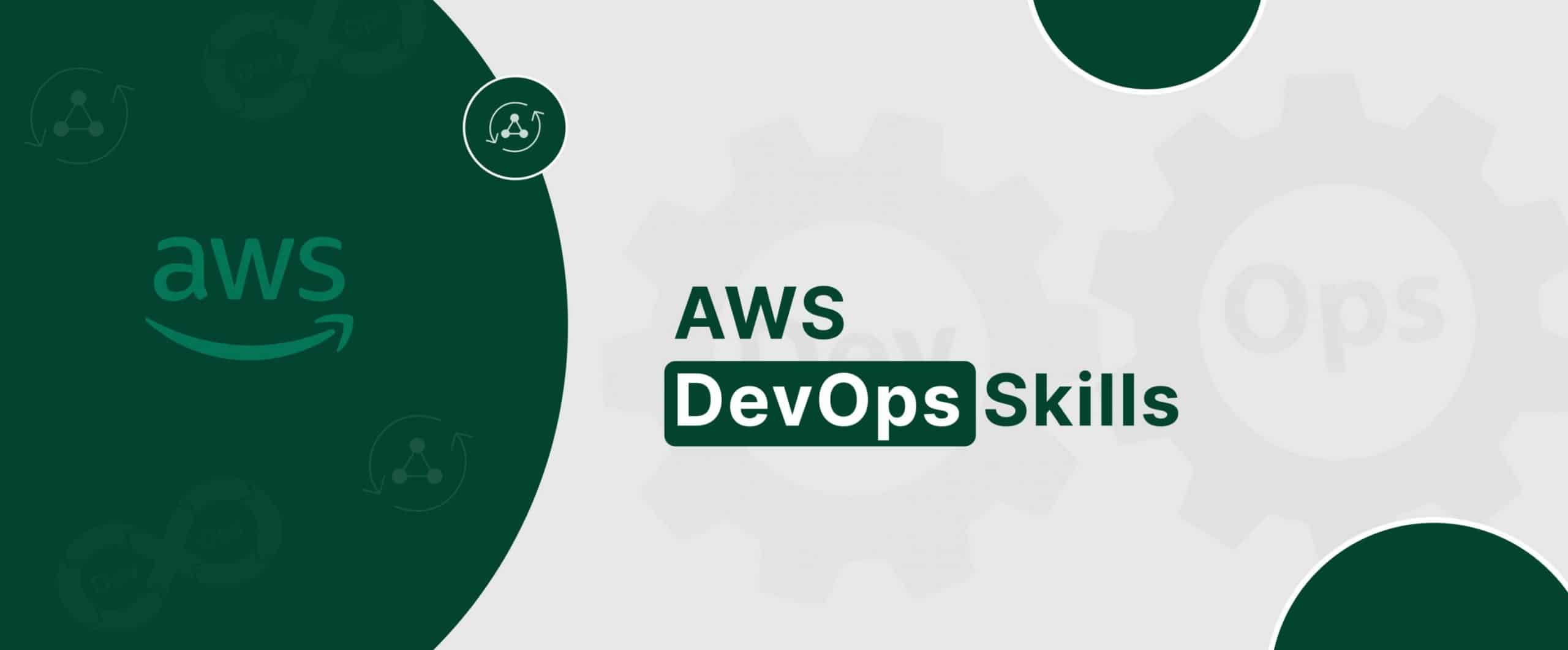Essential AWS DevOps Skills for Cloud Success

A few years ago, no one knew about cloud and DevOps services in the IT industry. However, today, DevOps engineering & AWS DevOps skills have become a lucrative career for IT and computer engineering aspirants.
When we look at the recent data on ZipRecruiter, we find that the average annual AWS DevOps engineer salary on AWS is $124,190.
However, the same scenario prevails across the globe and tempts software engineers to pursue degree/diploma/certificate courses in AWS and DevOps engineering.
Therefore, we have decided to discuss some essential aspects of AWS DevOps skills in the current post. Before diving into the AWS DevOps skill set, we must know about the primary roles and responsibilities of AWS DevOps engineers.
Who is an AWS DevOps Engineer?
AWS is a short form of Amazon Web Services. It’s a cloud computing platform that provides basic to advanced cloud services for a wide range of industries, including IT and software development.
DevOps is a set of practices that combine software development and IT operations with the purpose of speeding up the delivery of software and operations-related services throughout the software lifecycle.
Who are DevOps engineers then? DevOps engineers are professionals who introduce tools, processes, and methodologies to complete the software lifecycle from development, deployment, maintenance, and updates.
DevOps Engineer Roles & Responsibilities
The DevOps engineer can justify the following roles and responsibilities in the cloud and DevOps industries.
#1 – DevOps Evangelist or Leader:
The principal officer is responsible for implementing DevOps.
#2 – Software Engineer, Tester, and Developers:
A software engineer who designs the software architecture strategies writes codes and tests them.
#3 – Build & Release Engineer:
Who releases new features and ensures post-release product stability while maintaining the existing framework.
#4 – Automation Expert or Continuous Delivery Architect:
Who is responsible for achieving automation and orchestrating various AWS DevOps tools.
#5 – Security Engineer:
Who implements various security measures and monitors the safety and health of the system.
#6 – QA (Quality Assurance) or XA (Experience Assurance):
Who ensures the quality and experience of the product for anticipated metrics.
#7 – DevOps Operation Engineer:
Who is responsible for maintaining the environment and system engineering.
#8 – IT Support:
Who monitors and maintains all the computing systems in an organization for installation and configuration and resolves technical issues for hardware and software in the organization.
#9 – Agile Service Manager:
Who is responsible for applying and integrating agile thinking into IT service management.
#10 – Agile Process Owner:
Who ensures the performance of a process and delivers value to its shareholders.
Skills Required for AWS DevOps
AWS provides a range of tools to support various aspects of DevOps services. Let’s first learn about various tools, and then we will learn the required skills for AWS DevOps. We categorize these tools and services into different sections based on their roles.
AWS DevOps Skill Set#1 – CI/CD (Continuous Integration & Continuous Delivery):
Amazon Web Services supports CI/CD practices by offering a range of tools and cloud services, such as:
-> AWS CodePipeline Skill:
It’s a CD tool or service that compiles source code, runs tests, and produces software packages that are ready to deploy. AWS DevOps engineers must learn the tools and required skills to use it efficiently.
-> AWS CodeBuild Skill:
It’s a fully managed CI (Continuous Integration) service that compiles source code, runs tests, and deploys them. Developers need to provision, manage, and scale your build servers. The tool builds continuously and processes multiple builds concurrently.
-> AWS CodeDeploy Skill:
It’s a fully managed code deployment service that automates software deployment to a variety of computing services, including Amazon Elastic Compute Cloud, AWS Fargate, AWS Lambda, etc.
-> AWS CodeStar Skill:
It enables developers to develop, build, and deploy applications on AWS quickly. The tool allows developers to start releasing faster.
Another Topic Which might interest youHow to implement an AWS DevOps CI/CD Pipeline!
AWS DevOps Skill Set#2 – AWS Microservices
AWS allows developers to deploy a microservice architecture using containers or serverless computing. In due course, AWS DevOps requires skills to get mastery over two tools or services.
-> Amazon ECS (Elastic Container Service) Skill:
It’s a fully managed container orchestration service to deploy applications quickly, manage them, and scale containerized applications. It runs a container workload in the cloud.
-> AWS Lambda Skill:
It’s a serverless computing service to run code without provisioning or managing web servers. It creates workload-aware cluster scaling logic. It maintains event integrations or manages runtimes. AWS Lambda enables developers to run code for virtually any type of app or backend service without any administration need.
Developers must learn to write Lambda functions in Python, Node.js, Java, Go, etc., and use serverless and container tools to build, test, and deploy the functions.
AWS DevOps Skill Set#3 – IaC (Infrastructure as Code)
IaC follows a fundamental principle of DevOps that treats infrastructure the same way developers treat code. AWS offers the following tools and services in IaC.
-> AWS CloudFormation Skill:
It enables developers to create AWS resources in an orderly and predictable manner. Resources are written in JSON (JavaScript Object Notation) or YAML (Yet Another Markup Language) formats. So, developers must be familiar with these programming technologies.
-> AWS OpsWorks Skill:
It’s a configuration management service. It uses a Chef that treats server configuration as code. So, developers must be accustomed to AWS OpsWorks for Chef Automate and AWS OpsWorks Stacks.
-> AWS System Manager Skill:
It’s a management service. It automatically collects software inventory, applies OS patches, creates system images, and configures OS. It helps developers define and track system configurations, prevent drift, and maintain software compliance with EC2 and on-premises configurations.
-> AWS Config Skill:
It’s a management service that provides AWS resource inventory, configuration history, and configuration change notifications to enable security and governance.
AWS DevOps Skill Set#4 – AWS Monitoring & Logging
AWS provides robust monitoring, alerting, and auditing infrastructure for DevOps. Therefore, AWS DevOps engineer skills consist of hands-on expertise in monitoring and logging tools, including Amazon CloudWatch, Amazon X-ray, and AWS CloudTrail.
-> Amazon CloudWatch Skill:
Its metrics automatically collect data from AWS services. The tool organizes metrics as dashboards and alarms.
-> AWS X-ray Skill:
It helps developers to analyze and debug production. As its name suggests, the tool helps understand how the application and its underlying services are performing to recognize and troubleshoot the root causes of performance errors and problems.
-> AWS CloudTrail Skill:
In a collaborative environment, it is mandatory to know who is making modifications to the infrastructure. AWS CloudTrail provides this transparency. AWS API calls to monitor and log all AWS interactions. All generated log files are stored in Amazon S3 Bucket. All log files are encrypted using Amazon SSE (Server-side Encryption).
AWS DevOps Skill Set#5 – Version Control
Amazon Web Services offers AWS CodeCommit as an effective services for version control in DevOps. By mastering this tool, DevOps can enhance its skill set.
-> AWS CodeCommit Skill:
It’s a fully managed source control service. It hosts highly secure and scalable private Git repositories. You can secure anything from source code to binaries. It works seamlessly with existing Git tools.
AWS DevOps Skill Set#6 – Platform as a Service (PaaS)
Amazon Web Services provides PaaS services to deploy applications without provisioning and managing infrastructure and application stack. AWS Elastic Beanstalk is a tool/service that provides PaaS. DevOps must be familiar with it.
-> AWS Elastic Beanstalk Skill:
It’s an easy-to-use service for deployment and scaling web applications on the AWS platform. It supports applications developed using various programming technologies, including Python, Java, .NET, ROR, Go, and Dockers, on different servers such as Apache, Nginx, Passenger, and IIS.
AWS Elastic Beanstalk automatically manages the deployment, from capacity provisioning, load balancing, and auto-scaling to application and health monitoring.
Another Topic Which might interest youAWS DevOps vs Azure DevOps – Which is Better?
Wrapping It Up
We know different roles are available in the AWS DevOps career. Therefore, we need to develop AWS DevOps skills accordingly. DevOps is a cross-disciplinary career that demands commands on multiple skill sets ranging from development, testing, deployment, maintenance, and updates of the software throughout its lifecycle.
At iCommuneTech, we have gathered a pool of talented AWS DevOps with diverse skill sets. Therefore, you need not look elsewhere whenever you find a skill crunch in your organization. We offer to hire AWS DevOps skills plans at competitive rates. Let’s have a phone call with our technical team to learn more about AWS DevOps skills and where we can help your organization accomplish small to large-scale projects with our expert DevOps services along with various competitive advantages.
If this guide helped you, then make sure to share it with your friends and colleagues!

